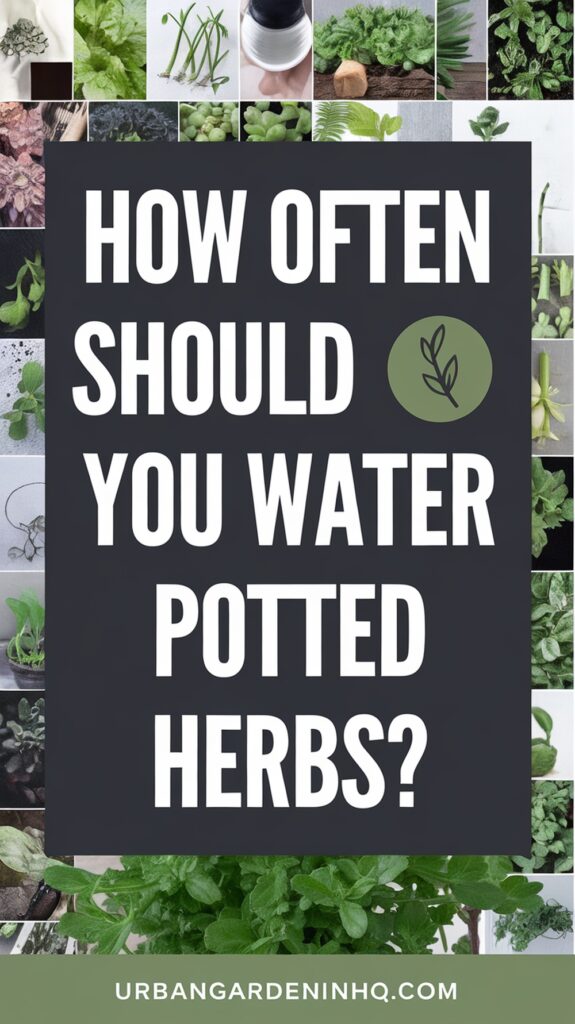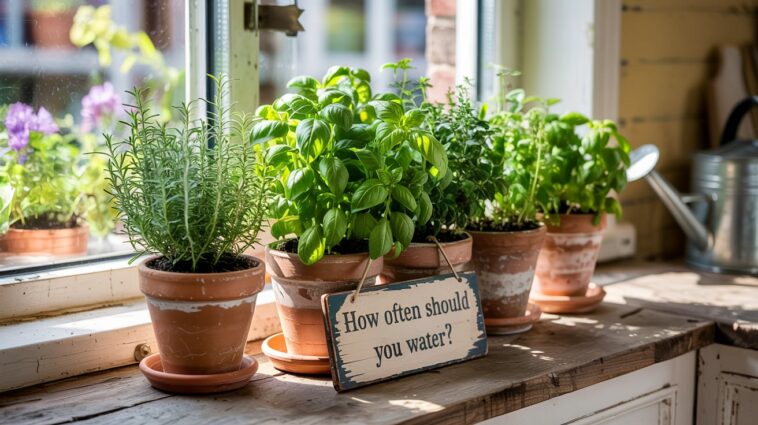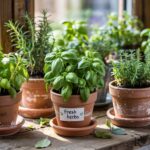There’s something deeply satisfying about stepping onto your balcony or into your kitchen and plucking fresh herbs straight from a pot. Whether you’re snipping basil for a pasta dish, mint for a cool drink, or rosemary for roasted veggies, growing herbs in containers makes home cooking more flavorful and rewarding. But when it comes to watering, many gardeners—especially beginners—ask the same question: How often should I water my potted herbs?
The answer isn’t as straightforward as “every day” or “once a week.” It depends on the type of herb, the container it’s in, the soil composition, your local climate, and even the time of year. In this post, I’ll guide you through understanding your herbs’ water needs so you can keep them healthy, lush, and full of flavor.
Why Proper Watering Is So Important for Potted Herbs

Watering is one of the most crucial aspects of growing herbs, especially when they’re confined to pots. Unlike herbs grown in the ground, container herbs don’t have the luxury of reaching deeper soil layers for moisture. Everything they need is in that one pot—and they rely on you to provide it.
Overwatering can drown their roots, leading to root rot and mold. Underwatering can cause the leaves to wilt, turn yellow, and drop off. That’s why developing a watering routine based on observation rather than a strict schedule is key to success.
General Watering Guidelines for Potted Herbs
While exact needs vary, here’s a good rule of thumb:
- Check the top inch of soil. If it feels dry to the touch, it’s time to water.
- Water thoroughly. Ensure water flows out of the bottom drainage holes. This helps the entire root system absorb moisture and prevents salt buildup.
- Avoid letting herbs sit in water. Always empty saucers after watering, or elevate pots above any standing water.
Most herbs prefer consistently moist but not soggy soil. However, this guideline shifts depending on the specific herb you’re growing.
How Often Should You Water? It Depends on the Herb
Here’s a closer look at how often to water some common potted herbs:
1. Basil
- Frequency: Every 2–3 days in warm weather; daily in peak summer heat.
- Notes: Basil is a thirsty herb that wilts quickly if neglected. It thrives with consistently moist soil but doesn’t like sogginess.
2. Mint
- Frequency: Every 2–3 days, or whenever the top inch of soil is dry.
- Notes: Mint enjoys moisture and tends to grow aggressively when watered regularly. Its roots are vigorous, so a deep watering helps keep it lush.
3. Rosemary
- Frequency: Every 5–7 days.
- Notes: Unlike basil or mint, rosemary is drought-tolerant and prefers to dry out a bit between waterings. Make sure the soil drains well.
4. Thyme
- Frequency: Every 5–7 days.
- Notes: Another Mediterranean herb, thyme likes drier conditions and dislikes soggy roots. Let the soil dry almost completely before watering.
5. Parsley
- Frequency: Every 2–4 days.
- Notes: Parsley enjoys moderate moisture. Don’t let it dry out too much, especially during hot spells.
6. Cilantro (Coriander)
- Frequency: Every 2–3 days.
- Notes: Cilantro grows quickly and bolts (flowers) in heat, especially if underwatered. Keep the soil evenly moist.
7. Oregano
- Frequency: Every 4–6 days.
- Notes: Like rosemary and thyme, oregano prefers slightly drier conditions and benefits from infrequent but deep watering.
Factors That Affect Watering Frequency
No two herb gardens are the same. Several variables can influence how often your potted herbs need a drink:
1. Container Size and Material
- Small pots dry out faster than larger ones.
- Terra cotta pots are porous and allow water to evaporate quickly.
- Plastic or glazed ceramic pots retain moisture longer.
2. Pot Drainage
- Always use pots with drainage holes. Herbs hate sitting in waterlogged soil.
- If you love decorative pots without holes, place a plastic nursery pot inside and remove it when watering.
3. Soil Type
- Use well-draining potting soil. A mix designed for herbs or vegetables often contains perlite or sand for better drainage.
- Avoid heavy garden soil, which retains too much water and compacts easily in containers.
4. Sun Exposure
- Herbs in full sun will dry out faster, especially in summer.
- If your balcony or windowsill gets intense afternoon light, check your soil daily.
5. Climate and Season
- In hot or windy climates, pots may dry out multiple times a day.
- During cooler months, your herbs may only need water once a week.
Signs Your Herbs Need Watering (Or a Break!)
Don’t just rely on the calendar—watch your plants. They’ll let you know how they feel.
Your herbs may need water if:
- The leaves look limp or droopy.
- The soil feels dry more than an inch deep.
- The plant looks dull or the leaves are curling.
Your herbs may be overwatered if:
- The leaves are yellowing or mushy.
- The soil stays soggy for days.
- There’s mold or a musty smell around the roots.
Tips for Watering Success
Here are a few tips to help you master herb watering in containers:
- Water early in the morning. This allows the roots to absorb moisture before the sun heats things up.
- Group herbs by their water needs. For example, grow rosemary and thyme together, but keep basil and mint in their own pots.
- Use a self-watering container. These are especially useful for thirsty herbs or gardeners who travel often.
- Mulch your pots. A layer of straw or bark can help slow evaporation and keep soil moist longer.
Final Thoughts
Growing potted herbs is one of the easiest ways to bring freshness to your kitchen and greenery to your living space. Once you get the hang of watering based on observation, your herbs will thrive. Think of watering as a conversation: your herbs will “speak” to you through their appearance and soil, and you’ll respond accordingly.
It’s okay to make a few mistakes along the way—every gardener does. But as you get more familiar with your plants and how they respond to heat, light, and watering, it becomes second nature. So don’t stress over exact schedules. Keep your fingers in the soil, your eyes on the leaves, and your watering can nearby—and your herbs will reward you all season long.


